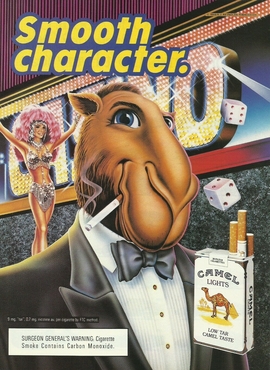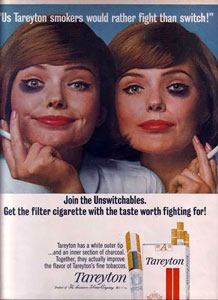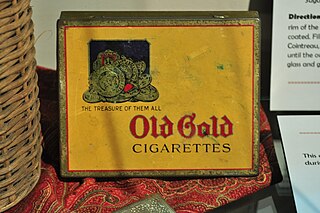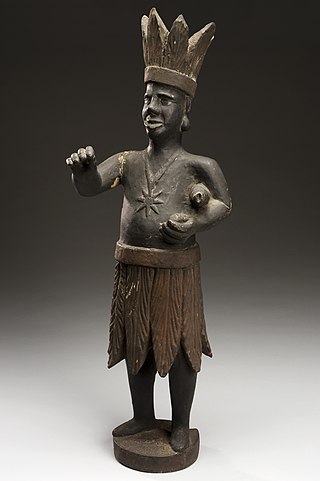
The R. J. Reynolds Tobacco Company (RJR) is an American tobacco manufacturing company based in Winston-Salem, North Carolina. Founded by namesake R. J. Reynolds in 1875, it is the largest tobacco company in the United States. The company is a wholly owned subsidiary of Reynolds American, itself a wholly owned subsidiary of British American Tobacco.

Camel is an American brand of cigarettes, currently owned and manufactured by the R. J. Reynolds Tobacco Company in the United States and by Japan Tobacco outside the U.S.

Joe Camel was an advertising mascot used by the R. J. Reynolds Tobacco Company (RJR) for their cigarette brand Camel. The character was created in 1974 for a French advertising campaign, and was redesigned for the American market in 1988. He appeared in magazine advertisements, clothing, and billboards among other print media and merchandise.

Kool is an American brand of menthol cigarette, currently owned and manufactured by ITG Brands LLC, a subsidiary of Imperial Tobacco Company. Kool cigarettes sold outside of the United States are manufactured by British American Tobacco.
Virginia Slims is an American brand of cigarettes owned by Altria. It is manufactured by Philip Morris USA and Philip Morris International.

Pall Mall is a British brand of cigarettes produced by British American Tobacco.
Capri is an American brand of cigarettes. It is currently owned and manufactured by the R. J. Reynolds Tobacco Company.
Newport is an American brand of menthol cigarettes, currently owned and manufactured by the R. J. Reynolds Tobacco Company. The brand was originally named for the seaport of Newport, Rhode Island.

Nicotine marketing is the marketing of nicotine-containing products or use. Traditionally, the tobacco industry markets cigarette smoking, but it is increasingly marketing other products, such as electronic cigarettes and heated tobacco products. Products are marketed through social media, stealth marketing, mass media, and sponsorship. Expenditures on nicotine marketing are in the tens of billions a year; in the US alone, spending was over US$1 million per hour in 2016; in 2003, per-capita marketing spending was $290 per adult smoker, or $45 per inhabitant. Nicotine marketing is increasingly regulated; some forms of nicotine advertising are banned in many countries. The World Health Organization recommends a complete tobacco advertising ban.

Salem is an American brand of cigarettes, currently owned and manufactured by ITG Brands, a subsidiary of Imperial Tobacco, inside the U.S. and by Japan Tobacco outside the United States.
Tareyton is an American brand of cigarettes, currently owned and manufactured by the R.J. Reynolds Tobacco Company.
Doral is an American brand of cigarettes, currently owned and manufactured by the R.J. Reynolds Tobacco Company.
Winston is an American brand of cigarettes, currently owned and manufactured by ITG Brands, subsidiary of Imperial Tobacco in the United States and by Japan Tobacco outside the U.S. The brand is named after the town where R. J. Reynolds started his business which is Winston-Salem, North Carolina. As of 2017, Winston has the seventh-highest U.S. market share of all cigarette brands, according to the Centers for Disease Control and Prevention and the Maxwell Report.

"Us Tareyton smokers would rather fight than switch!" is a slogan that appeared in magazine, newspaper, and television advertisements for Tareyton cigarettes from 1963 until 1981. It was the American Tobacco Company's most visible advertising campaign in the 1960s and 1970s.

Merit is an American brand of cigarettes, currently owned and manufactured by Philip Morris USA in the United States and Philip Morris International outside the United States.
Alan Landers was an American male model and actor, best known as the "Winston Man", who appeared in advertising for Winston cigarettes.

Old Gold is an American brand of cigarette owned and manufactured by the R. J. Reynolds Tobacco Company.

As nicotine is highly addictive, marketing nicotine-containing products is regulated in most jurisdictions. Regulations include bans and regulation of certain types of advertising, and requirements for counter-advertising of facts generally not included in ads. Regulation is circumvented using less-regulated media, such as Facebook, less-regulated nicotine delivery products, such as e-cigarettes, and less-regulated ad types, such as industry ads which claim to discourage nicotine addiction but seem, according to independent studies, to promote teen nicotine use.

The history of nicotine marketing stretches back centuries. Nicotine marketing has continually developed new techniques in response to historical circumstances, societal and technological change, and regulation. Counter marketing has also changed, in both message and commonness, over the decades, often in response to pro-nicotine marketing.
Electronic cigarettes are marketed to smoking and non-smoking men, women, and children as being safer than cigarettes. In the 2010s, large tobacco businesses accelerated their marketing spending on vape products, similar to the strategies traditional cigarette companies used in the 1950s and 1960s.












